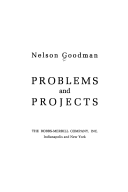The Shortest Route
For if as scientists we seek simplicity, then obviously we try the simplest surviving theory first, and retreat from it only when it proves false. Not this course, but any other, requires explanation. If you want to go somewhere quickly, and several alternate routes are equally likely to be open, no one asks why you take the shortest. The simplest theory is to be chosen not because it is the most likely to be true but because it is scientifically the most rewarding among equally likely alternatives. We aim at simplicity and hope for truth.
Notes:
Isn't taken because it's easiest, but because we look for elegant simplicity.
Folksonomies: simplicity problems solutions
Taxonomies:
/technology and computing/programming languages (0.529896)
/travel (0.474896)
/business and industrial/construction (0.414074)
Keywords:
simplest surviving theory (0.920308 (positive:0.202158)), equally likely alternatives (0.903169 (positive:0.783340)), elegant simplicity (0.710988 (positive:0.704532)), Shortest Route (0.690665 (neutral:0.000000)), alternate routes (0.605512 (negative:-0.290988)), simplest theory (0.566962 (positive:0.414357)), retreat (0.297880 (negative:-0.544724)), truth (0.293867 (positive:0.540223)), course (0.289995 (negative:-0.521960)), explanation (0.289438 (negative:-0.337793))
Concepts:
Theory (0.941319): dbpedia | freebase
Occam's razor (0.775530): dbpedia | freebase | yago
Scientific method (0.765450): dbpedia | freebase
Science (0.746327): dbpedia | freebase | opencyc
Truth (0.718799): dbpedia | freebase
Fact (0.604433): dbpedia | freebase
Mathematics (0.585098): dbpedia | freebase | opencyc
Epistemology (0.568774): dbpedia | freebase | opencyc





